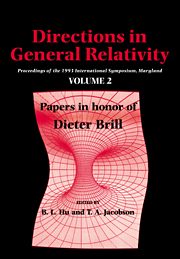 Directions in General Relativity
Directions in General Relativity Published online by Cambridge University Press: 06 January 2010
ABSTRACT
If string theory describes nature, then charged black holes are not described by the Reissner-Nordström solution. This solution must be modified to include a massive dilaton. In the limit of vanishing dilaton mass, the new solution can be found by a generalization of the Harrison transformation for the Einstein-Maxwell equations. These two solution generating transformations and the resulting black holes are compared. It is shown that the extremal black hole with massless dilaton can be viewed as the “square root” of the extremal Reissner-Nordström solution. When the dilaton mass is included, extremal black holes are repulsive, and it is energetically favorable for them to bifurcate into smaller holes.
INTRODUCTION
It is a pleasure to honor Dieter Brill on the occasion of his sixtieth birthday. Over the years, Dieter has worked on many aspects of general relativity. But two of his recent interests are negative energy (in higher dimensional theories) (Brill and Pfister 1989; Brill and Horowitz 1991), and the possibility that extremal charged black holes can quantum mechanically bifurcate (Brill 1992). I would like to describe some recent work which touches on both of these areas.
For many years, it has been widely believed that static charged black holes in nature are accurately described by the Reissner-Nordström solution.
To save this book to your Kindle, first ensure [email protected] is added to your Approved Personal Document E-mail List under your Personal Document Settings on the Manage Your Content and Devices page of your Amazon account. Then enter the ‘name’ part of your Kindle email address below. Find out more about saving to your Kindle.
Note you can select to save to either the @free.kindle.com or @kindle.com variations. ‘@free.kindle.com’ emails are free but can only be saved to your device when it is connected to wi-fi. ‘@kindle.com’ emails can be delivered even when you are not connected to wi-fi, but note that service fees apply.
Find out more about the Kindle Personal Document Service.
To save content items to your account, please confirm that you agree to abide by our usage policies. If this is the first time you use this feature, you will be asked to authorise Cambridge Core to connect with your account. Find out more about saving content to Dropbox.
To save content items to your account, please confirm that you agree to abide by our usage policies. If this is the first time you use this feature, you will be asked to authorise Cambridge Core to connect with your account. Find out more about saving content to Google Drive.